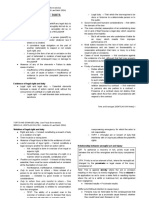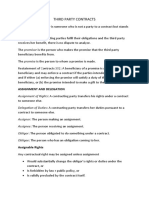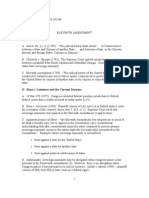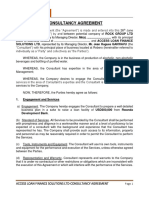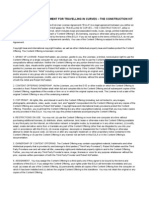Subject Matter Jurisdiction
Gordon v. Steele
376 F. Supp. 575 (W.D. Pa. 1974)
Nature of Case: This was a motion to dismiss for lack of diversity
jurisdiction.
Facts:
Gordon (P) brought action for malpractice against 2 doctors & a hospital in
Erie Co., Pennsylvania after she injured her wrist & was treated by the
defendants (previously listed). Her wrist was fractured & P endured pain, was
hospitalized & partially disabled. The injury occurred in Feb 1972. P claimed
that D wrongfully diagnosed her condition & b/c of that- she endured pain,
hospitalization, & the wrist remained partially disabled as result of Ds
negligence.
P brought this suit in federal court for malpractice of this negligent
diagnosis. P claimed diversity jurisdiction b/c she was now residing in
Idaho where she went to college in 1982.
Note**: Under 1332 (a)(1) a fed court can hear a suit arising under state law
if the damages are more than $75,000 & the defs & Ps are citizens of diff
states.
D filed a motion to dismiss for lack of diversity.
Gordons prior address was in Pennsylvania & the suit would fail the diversity
test if that was found to be her residence.
D claimed that P still resided in Penn. b/c of college records that listed
Erie as her address on her application & records, summer work, a bank
accnt, drivers license, & her return home for X-mas.
Gordon (P) attended a Mormon school, but b/c she was a woman she was not
required to do mission work abroad & she claimed that she only went home
for summer vacation & medical Tx. P intended to stay in Idaho to marry into
her faith & retain ties w/ her church. She became a member of Blue Cross of
Idaho in 1972 also. After grad, she would relocate somewhere else.
Ps intention was not to return to PA.
Procedural History:
P injured her wrist and alleges she was misdiagnosed and mistreated by D.
At time of the filing of suit, P was living in ID for college. D was in PA.
P sued D in PA district court through diversity jurisdiction.
D moved for dismissal for lack of federal jurisdiction.
District court dismissed D's motion, diversity jurisdiction valid.
Issue: 1.) How does one determine residency in a state (for purposes of
federal diversity jurisdiction)? OR
2.) Is the intention of a party upon arrival in a new state impt for the
determination of diversity jurisdiction?
�Subject Matter Jurisdiction
Holding/Rule:
A party is determined to be a resident of a state if one is domiciled in that
state with the intent to remain indefinitely.
2.) Yes. The traditional presumption related to residency of a college student
is that b/c the student is financially dependent on his parents, he will remain
a citizen of the state where his parents reside. More recently, 3 rd Circuit
decisions have applied the rule that an indv is a citizen of the state wherein
he resides w. an intent to remain indefinitely. There need be no intent to
remain permanently. Citizenship at the time of filing is what matters for
diversity purposes. The subjective intent of a person to remain in a state at
the time of arrival in that new state is impt in determination of citizenship for
diversity purposes. P intended to remain in Idaho & had no intention to return
to PA. Motion to dismiss is denied.
Reasoning:
Subjective intent to remain indefinitely is an impt element in determination of
a domicile. The burden if proving domicile for diversity purposes falls upon
the P. The determination of a domicile is a matter for the trier of fact.
Diversity is NOT detd at any other time other than when the suit is
filed.
Notes:
Domicile- The place at which a person has been physically present &
that the person regards as home; a persons true, fixed, principal, &
permanent home, to which that person intends to return & remain
even though currently residing elsewhere.
A persons domicile is the place w/ which that person is most closely
associated- his/her home w/ all the connotations of the word.
Category of Civil Procedure: Federal Subject Matter Jurisdiction (SMJ)
Diversity Jurisdiction: cases b/t citizens of different states.
The framers of the Constitution created diversity jurisdiction in Article
III, 2 to provide a neutral forum for cases involving a risk of local bias.
USSC has held that Congress may authorize the federal courts to hear
some diversity cases, but not others= theres a minimum amount-incontroversy requirement.
28 U.S.C. 1332. (a) The district courts shall have original jurisdiction
of all civil actions where the matter in controversy exceeds the sum or
value of $75,000, exclusive of interests & costs, & is b/t1. citizens of different states;
2. citizens of a State & citizens or subjects of a foreign state,
except that the district courts shall not have original
jurisdiction under this subsection of an action b/t citizens of a
State & citizens or subjects of a foreign state who are lawfully
admitted for permanent residence in the US & are domiciled
in the same State;
3. citizens of diff States & in which citizens or subjects of a
foreign state are additional parties; &
�Subject Matter Jurisdiction
4. a foreign state, defined in section 1603(a) of this title, as
plaintiff & citizens of a State or of different States.
Under 1332(a), a case b/t a citizen of MO & a citizen of AR, involving a
dispute involving a $25,000 contract claim, could NOT be brought in fed court
based on diversity jurisdiction, b/c the amount in controversy is below the
reqd amount.
State Citizenship of Individual: The Domicile Test
To det. if a fed court has diversity jurisdiction the fed courts had to det. the
meaning of an individuals state citizenship.
The court uses an individuals domicile to det. an individuals state
citizenship.
2 Requirements (to test for State Citizenship): Domicile
1. Residence
2. Indefinite Intent
a. Courts hold that a person does not lose her old domicile until she
acquires a new onei.e., until she goes to another state w/ the
intent to reside indefinitely in the new state.
b. Indefinite Intent: The party intends to make the new state home
& that the person has no present intention of going elsewhere [to
live].
Hypotheticals for Applying the Domicile Test:
Q1: Susan Gordon, after growing up in PN, goes to college in Idaho planning
to get a 2 year degree & return to practice nursing in PN. Two months after
starting school, she files suit in a PN fed district court against Dr. Rodriguez, a
PN citizen who treated her in PN for an injury. She claims jurisdiction based on
diversity. The court probably:
A1: lacks diversity jurisdiction, b/c Gordon is still domiciled in PN. She
intended to return to PN after the 2 yr degree program- she is in Idaho for a
definite time only & therefore had no indefinite intent to stay in Idaho & had
not acquired a new domicile.
Where is Susan Domiciled in the following Exs??:
Q2: Susan Gordon goes to college, planning to get a 2 yr degree & then move
to Cali to work in a hospital there. Before leaving for Ricks College, she
announces to her friends that she is never coming back to PN. Two months
after starting school, she sues the PN doctors.
A2: Pennsylvania. She has NOT formed a new domicile in Idaho (location of
college), since she was only there for a definite period of time. She hasnt
formed a new domicile in Cali either b/c she has not moved there yet.
Ironically, though she swears she will never go back to PN, she does not lose
her PN domicile until she forms a new one.
Q3: Susan goes from PN to Ricks College, planning to get her degree &
practice nursing in Idaho. After 3 mos at college, she decided that she does
�Subject Matter Jurisdiction
not like Idaho & will return to PN after she completes her degree. The next
week she brings the suit.
A3: Idaho. When she arrived in Idaho planning to stay, she acquired domicile
there. Although she now intends to leave Idaho, she wont lose her Idaho
domicile until she goes to another state w/ intent to remain there indefinitely.
Q4: Susan goes from PN to college (Idaho), planning to get her degree &
practice nursing in Cali. After 3 mos at college, she decides she likes Idaho &
will stay there to practice nursing after she gets her degree. She brings suit a
month after she makes that decision.
A4: Idaho. Susan did not acquire domicile when she moved to Idaho but did
when her intent changed while she was living there. The statement quoted in
Gordon that it is intention at the time of arrival which is impt is misleading.
Even though Gordon didnt form a domicile on the day that she moved there,
she does form it later when she is living there & decides to stay.
Q5: Susan Gordon goes from PN to college in Idaho, planning to
practice nursing after she finishes her degree, but w/ no plan as to
where she will do so. A month after starting school, she sues the PN
defendants.
A5: Here, Gordon has no clear intent to leave Idaho. She might, but has
no definite plan to do so or anything else. The better answer is that she
acquires domicile in Idaho.
Alternative to the intent-to-remain-indefinitely test:
**To est a domicile of choice a person generally must be physically
present at the location & intend to make that place his home for at
least that time. NOTE: Most courts do NOT apply this!!
The date for deting diversity:
The parties must be diverse on the day the complaint is filed.
If the parties are diverse on the date it is filed, even if the parties were
not diverse @ the time of the events giving rise to the claim, or later at
litigation, it would still be a proper diversity case.
Ex: P was fro Utah & had an accident w/ another Utah citizen. He
moved to CO briefly & brought suit against def. Although he returned
to live in Utah after filing suit, the court upheld the diversity jurisdiction
since the parties were diverse on the date of filing.
Evidence in Testing for Domicile:
Wide variety of evid is used to det. a partys domicile. In Gordon, the
court considered evid of her drivers license, her health insurance, her
apt, religious affiliations, & etc.
These facts may point to one state, but the person would still
lack the subjective intent to remain there indefinitely.
�Subject Matter Jurisdiction
Ex: Student graduates from med school in AL & starts 3 yr residency
at a hospital in GA, planning to return home to AL to est a practice.
Shed rent an apt, pay local taxes, & get a drivers license & other
local affiliationsBUT if it is clear that she plans to leave at a
particular point, these indicia would not est a GA domicile. *It is the
persons intent that is the test.
If Qing someone trying to det. domicile- be sure to ask about
future intentions.
If diversity exists, which federal district court has jurisdiction?:
The diversity statute, 28 U.S.C. 1332(a), provides that the fed
district courts shall have jurisdiction over cases b/t citizens of
diff states.
If the P & D are from diff states, any fed district court will have
jurisdiction over the case. The particular fed district the P
chooses matters in deting whether the court has personal
jurisdiction over the def or is a proper venue, BUT is IRRELEVANT
in deting whether the court has subject matter jurisdiction over
the case.
Note: The fact that a case can be filed in fed court as a diversity case
does not mean that it must be filed in fed court.
Diversity Rule when/if there are multiple plaintiffs or defendants?:
The Complete Diversity Rule
Mas v. Perry
489 F.2d 1396 (5th Cir. 1974)
Facts: Mr. Mas (P) = French citizen & Mrs. Mas (P1) = citizen of MS &
they married in MS. They lived & worked in Louisiana. After the
marriage, they went to Louisiana to complete Ps education & to cont.
employment @ LSU. They were unsure of how to proceed w/ their
affairs after P was finished w/ school so they rented an apt from Perry
(D). D used 2-way mirrors to invade their privacy in the bedroom &
bathroom. Ps sued for invasion of privacy in fed court on the basis of
diversity. Ps obtained a $5,000 & $15,000 judgment. D appealed;
contending they were citizens of Louisiana & so there was no diversity.
P was a citizen of France during the entire proceedings. D believed that
P1s domicile was Louisiana or that she acquired French citizenship
upon her marriage.
Issue: 1. For diversity purposes, is mere residence sufficient to create
a domicile? 2. Is the domicile of a wife always that of her husband if
the husband is a foreign citizen? 3. Is the determination of state
citizenship for diversity purposes a matter of fed common law & is not
determined by state law?
�Subject Matter Jurisdiction
Holding: 1. No. 2. No. 3. Yes.
Domicile requires 2 things: taking up residence in a different domicile with the
intention to remain there.
A person remains a domicile of one place until that person has adopted a new
domicile through physical presence & intent to remain.
-Domicile is determined as a matter of federal law, not state law.
-The state of a persons residence is not necessarily the state of domicile for
purposes of establishing diversity jurisdiction.
Mr. Mas can establish diversity jurisdiction against Perry in any case
because 28 USC 1332(a)(4) does not apply to aliens who are not permanent
residents of the United States, regardless of their place of domicile.
Formerly, the domicile of a wife was deemed to be that of her husband. The court
abandoned that rule in this case & held that for diversity purposes a womans
domicile does not change solely by marrying an alien.
Reasoning:
A persons domicile is the place of his true, fixed, & permanent home &
principal establishment, & to which he has the intention of returning
whenever he is absent therefrom. A change of domicile may be
effected only by a combination of 2 elements: a) taking up residence in
a different domicile/state with b) intention to remain there.
For a court to have subject matter jurisdiction over a case based on 28
U.S.C. 1332, complete diversity must exist b/t the P & the D (no
plaintiff may be a citizen of the same state as any defendant).
Strawbridge v. Curtiss
The Diversity Statute= requires complete diversity b/t ALL Plaintiffs &
ALL Defendants
To be a proper diversity case, no P can be a citizen of the same state
as any defendant.
State Citizenship of Corporations & Other Entities:
In 1844, the Court held that corporations are state citizens & can
invoke the diversity jurisdiction of the federal courts deeming them
citizens of the state that incorporated them- even if they did not have
any operations or businesses in the state. (Marshall rule)
In 20th c, Congress enacted 28 U.S.C. 1332 (c) (1), which
provides: that a corporation shall be deemed a citizen of every State
& foreign state by which it has been incorporated & of the State or
foreign state where it has its principal place of business.
�Subject Matter Jurisdiction
The statute makes corporations local in the state where their
principal place of business is located, eliminating diversity suits
b/t the corporation & citizens of that state.
Corporations w/ large operations in multiple states: Suppose a state
has a principal place of business in Mississippi, but also has a store in
Texas. Is it diverse from a Texas citizen?
Yes. 1332 (c) (1) refers to State or foreign state where the
corporation has its principal place of business. Courts have
interpreted this to mean that a corp can have only 1 principal
place of business for diversity purposes. (even if it does a great
deal of business in other states, it wont be deemed a citizen of
those other states too).
Corporations have dual-citizenship in the state in which they were
incorporated & the state of their principal place of business. So, if a
citizen from the incorporated state filed suit against the corporation
even though it does no business there there would be NO diversity
b/c the corporation is still seen as local.
Problem with 1332 (c) (1)= it requires for the courts to determine a
corps principal place of business
See Hertz v. Friend.
Hertz Corp. v. Friend
559 U.S. 77 (2010)
Facts: The federal diversity jurisdiction statute provides that a
corporation shall be deemed to be a citizen of any State by which it
has been incorporated & of the State where it has its principal place of
business. 28 U.S.C. 1332(c)(1).
Hertz Corp. (D) had a class action suit brought against it by its
California-based employees (P), who claimed that it had violated
Californias wage and hours labor statutes. Hertz Corp (D) attempted to
have the case removed to federal court on the ground of diversity
jurisdiction, which makes provision for a corporation to be deemed a
citizen of any state by which it has been incorporated and of the state
�Subject Matter Jurisdiction
in which it has its principal place of business. The employers (P) raised
the counter-claim that CA was the principal place of business, b/c the
corporation received more income from this state than any other, &
also b/c it conducted most of its business in CA.
To support its position, Hertz (D) submitted a declaration by an
employee relations manager that sought to show that Hertzs
principal place of business was in New Jersey, not CA.
It stated that the leadership of D & its domestic subsidiaries is
located @ Ds corporate headquarters in New Jersey; that its
core executive & administrative functions are carried out
there & to a lesser extent in OK City, Oklahoma; & that its
major admin operationsare found at those 2 locations.
The court applied 9th Circuit precedent, which instructs courts to ID a
corporations principal place of business by 1st determining the
amount of a corporations business activity State by State.
If the amount of activity is significantly larger or substantially
predominates in one State, then that State is the corporations
principal place of business. If there is no such State, then the
principal place of business is the corporations nerve center,
i.e., the place where the majority of its executive &
administrative functions are performed.
Procedural History:
The district court of CA ruled that Ds principal place of business was
CA, & diversity was therefore lacking remanded the case to the state
courts.
Hertz appealed the District Courts remanded order.
The 9th Circuit affirmed. Hertz filed petition for certiorari. The Supreme
Court granted certiorari.
Issue:
Does the principal place of business refer to the place where the
corporations high level officers direct, control, & coordinate the
corporations activities, the corps nerve center?
Rule of Law:
The phrase principal place of business refers to the place where the
corporations officers direct, control, & coordinate the corporations
activities. It is the corporations nerve center.
Holding:
Yes.
Note:
�Subject Matter Jurisdiction
What if a corporations headquarters & executive offices were in the
same State in which it did most of its business Test is
straightforward- its principal place of business is located in that State.
BUT suppose the corp headquarters, including exec offices, are
in 1 state, while the corporations plants or other centers of business
activity are located in other states?: In 1959, a fed district judge,
answered that Q in part: Where a corporation is engaged in far-flung &
varied activities which are carried on in diff states, its principal place of
business is the nerve center from which it radiates out to its
constituent parts & from which its officers direct, control & coordinate
all activities w/o regard to locale, in the furtherance of the corporate
objective.
Manipulating Jurisdiction:
Q: Suppose Hertz Corporation, intent on suing a New Jersey citizen in
federal court, were to move its corporate headquarters to Wisconsin, to
create diversity. Would the parties be diverse?
A: Corps have done this on occasion, & the Court has found diversity
satisfied as long as the corporation really did change its citizenship.
However, it would rarely make sense for a corp to uproot its corporate
offices & move to another state just to invoke fed jurisdiction in a
particular case.
Partnerships & unincorporated associations= treated as groups of
individual litigants, not as corporations.
Applying the Test to a Partnership:
Q: Rota, a PN citizen, sues Matthews, Bernstein, Rollins & Grey, a 120person law firm w/ offices in NYC. Her claim is for fraud. Most of the
partners live in NY, but 10 live in New Jersey & one in PN. Is this a
diversity case??
A: No. The law firm is considered to be a citizen of NY, New Jersey, &
PN. As a result, there is no complete diversity. Since the claim arises
under state law, & there is no diversity jurisdiction, the case must be
brought in state court.
Perfecting Diversity:
Q: Jiminez, a Colorado plaintiff, sues 3 defendants, Kramer & Jost (2
indvs from Wyoming) & Delta Corp, incorporated in Wyoming w/ a good
deal of business in Wyoming & Colorado. Just before trial, Delta moves
to dismiss, claiming that Colorado is its principal place of business. The
court takes evidence & hears argument on the issue & concludes that
Delta is right. Consequently, it is a citizen of both Wyoming (based on
�Subject Matter Jurisdiction
incorporation) & CO (based on its principal place of business). Must the
court dismiss the case?
A: The court cannot hear the case as originally framed bc there is not
complete diversity. However, it need not dismiss the entire suit; it can
order Delta dropeed as a def, thus perfecting diversity, & cont. w/ the
case against the 2 indv defs.
Applying the Complete Diversity Rule: Corey v. Barristers
Q: You represent Corey in his bar fight case & would like to file the
case in fed court based on diversity jurisdiction. Assume that Corey is a
citizen of MA, based on his domicile there. Barristers is incorporated in
Delaware. It owns & operates 8 bars in MA. It also owns & operates one
in Rhode Island (where it also has its corporate headquarter), 2 in
Connecticut, & one in Maine. A federal court would
A: have diversity jurisdiction, b/c Corey is a citizen of MA & Barristers
is a citizen of Rhode Island & Delaware.
*The answer to the Q turns on whether Barristers principal place of
business is in MA or Rhode Island.
The Amount-in-Controversy Requirement:
St. Paul Mercury Test- The judge will look @ injuries the P has alleged
in the complaint & ask herself whether it is possible that a jury could
award more than $75,000 for those injuries. If it could, then more than
$75,000 is in controversy; if not, the case will be dismissed.
The St. Paul Mercury Test = gives P the benefit of the doubt.
�Subject Matter Jurisdiction
If she will probably recover $75,000, but might not, the amount
requirement is met.
If she will NOT recover that much but conceivably could, the
amount is met.
Diefenthal v. C.A.B.
681 F.2d 1039 (5th Cir. 1982)
Facts:
Diefenthals (Ps) bought 1st class tickets on a flight operated by Eastern
Airlines (Eastern/Def). Diefenthals specifically requested seating in the
smoking section of the plane & confirmed the request before boarding, but
once onboard, the flight attendant turned them away.
The Diefenthals claim that the flight attendant brusquely told them
that the 1st class smoking section was at capacity, & that only non-smoking
1st class seating was available.
Diefenthals filed suit in federal district court against Eastern for breach
of contract & tortious embarrassment & humiliation (as well as the Civil
Aeronautics Board (defendant) on various claims).
Eastern sought dismissal on the ground that the Diefenthals had failed
to state a claim for which relief could be granted.
The district court concluded that it did not have diversity jurisdiction over the
case. The parties did have diverse citizenship, BUT the court stated that not
even by the wildest stretch of the imagination could an award of more than
$10,000 (the amount in controversy then required by 28 U.S.C. 1332 for
federal diversity jurisdiction) be granted on the basis of the complaint.
The court gave the Diefenthals leave to amend their tort claim, w/ the
warning that the amount in controversy would still be an issue.
The amended complaint accused the flight attendant of maliciously &
intentionally [treating] Ps in a manner calculated to cause Ps serious
embarrassment & humiliation & claimed $50,000 in damages.
The complaint made no mention of physical or emotional harm or loss
of reputation. Eastern again moved to dismiss, & the court again concluded
that based upon the facts alleged in the complaint, a $10,000 award was
inconceivable. The Diefenthals appealed the dismissal to the U.S. Court of
Appeals.
Diefenthals did not attempt to support their complaint w/ affidavits
which might have revealed some factual basis for their claim for
damages they simply rested on an unsupported allegation that the
stewardess humiliated them.
Issue:
Whether the evidence of Ps injuries could possibly support a jury verdict
over the required amount.
Held:
�Subject Matter Jurisdiction
NO. Claims for damages must be supported by legal and factual
bases in order to satisfy diversity jurisdiction.
Reasoning:
Ps ridiculous claims of extreme humiliation and emotional distress were
unfounded on legal and factual bases, although they claimed that their
damages claim was made in good faith the court found that unsupported
allegations wont satisfy diversity jurisdiction requirement.)
The party invoking the courts jurisdiction has the burden of esting the
factual basis of his claim by pleading or affidavit.
St. Paul Mercury Co v. Red Cab Co. (1938) the Court stated:
The rule governing dismissal for want of jurisdiction in cases
brought in the federal court is that, unless the law gives a diff
rule, the sum claimed by the P controls if the claim is apparently
made in good faith. It must appear to a legal certainty that the
claim is really far less than the jurisdictional amount to justify
dismissal.
Judgment: The district court properly dismissed their claims.
AFFIRMED.
Q & A: The Amount in Controversy Requirement
Q1: How can the court conclude that there is not more than $10,000 in
controversy when the Ps have each claimed $50,000 in their complaint?
Although a P is given substantial leeway in alleging damages, the
damages allegations may be so far-fetched that there is no conceivable
way that the damages could exceed the jurisdictional amount.
Q2: Good Faith. St. Paul Mercury suggests that the Ps demand will be
accepted if it is made in good faith. On the other hand, it holds that the
case should be dismissed if it appears to a legal certainty that the P could
not recover the reqd amount. Suppose that the Diefenthals really
believed that they should each recover $50,000 for the humiliation they
suffered, but the judge concludes that it is legally certain they would only
be able to recover less than the reqd jurisdictional minimum.
Should the judge dismiss the case for failure to meet the amount-in
controversy requirement?:
YES. Although St. Paul Mercury says good faith, Diefenthals genuine
belief that they are entitled to a large verdict will not meet the amount
req. There must be a legal & factual basis for a recovery of the reqd
amount. Even if a P & her lawyer are convinced that the damages
�Subject Matter Jurisdiction
exceed the jurisdictional amount, the case will be dismissed if there is
no evidentiary basis to supt such an award.
Q3: Santini sues Chang for serious personal injuries that would supt a
damage award over the reqd amount. BUT, jury finds that Chang was not
negligent & renders a verdict for her. Should the court dismiss the case after
trial for failure to meet the amount-in-controv. req.?
NO. Santini did satisfy the amount requirement. He filed a case that
plausibly alleged that Chang was liable for the injuries (a claim for
more than $75,000) that satisfied the amount req.
Q4: In Kahn v. Hotel Ramada of NV, 1986, P left his suitcase @ a hotel, & it
was lost. Kahn, a jewelry broker, alleged it contained some $50,000 in jewelry
(the amount in controversy @ this time had to exceed $10,000). A NV statute
limited an innkeepers liability for lost property to $750. The hotel moved to
dismiss Kahns suit for failure to meet the amnt in controv. req.
What should the court do?:
Court should dismiss the case for lack of subject matter jurisdiction,
since the P cannot meet the amount-in-controversy requirement.
Unless the P has an argument that the statute is somehow
inapplicable, there is a legal certainty that the P cannot recover more
than $750, well below the reqd amount.
Note: A judge must resolve the amount-in-controversy issue by looking at the
nature of the Ps injuries, not at a # @ the end of the complaint.
**Meaning- you will want to KNOW THE FACTS about INJURIES to det. whether
a jury could award more than the reqd amount.
�Subject Matter Jurisdiction
Aggregating Claims to Meet the Amount Requirement:
A Single Plaintiff :
o may aggregate (add together) any separate claims she has against a
single def to meet the amount-in-controversy requirement, even if the
claims are unrelated.
Co-Plaintiffs:
o CANNOT add their claims together to reach the amount requirement
o CANNOT add diff amounts demanded from diff defendants to meet the
requirement.
EXCEPTION:
The enactment of 28 U.S.C. 1367, the supplemental jurisdiction statute
changed the rule for Co-Plaintiffs
o If the 1st Plaintiffs claim meets the amount requirement, the 2 nd
Plaintiff may join too.
Common Undivided Interest: In cases where 2 people share the same
common interest such as an investment of their funds by a 3 rd party such as
a bank that led to a loss of $80,000 Although the value of their individual
interests have been diminished only by $40,000- they could both sue the
bank in fed court under 1332.
Class Notes: 8/27
I. Corporate Citizenship for Diversity Jurisdiction
A corporation is a citizen of:
Its place of incorporation AND
Its principal place of business. 1332(a) & (c)(1)
Hertz Resolves circuit split regarding the meaning of principal place of
business:
Diff approaches prior to Hertz case.
USSC adopted the Nerve Center Test instead of the Business Activities Test:
1. Nerve Center Test- location from which the business radiates out to its
constituent parts & from which the businesss officers direct, control, &
coordinate all activities w/o regard to locale in furtherance of the
corporate objective. **MUCH SIMPLER.
-where top officers direct companys activities
-CAN ONLY HAVE ONE principal place of business cannot just look @
the stateyou have to look at the actual location can not meet at
several diff locations to deem principal place of business.
-Place where they regularly control, & direct activities from.
2. Business Activities Test- (corporate muscle test) where the business
conducts the bulk of its activities.
3. Total Activity Test: synthesis of the 2 prev. tests (depended on the
circumstances which test was used).
�Subject Matter Jurisdiction
#2 & #3= Court does not use!!!!
3 Reasons given to Supt the Adoption of The Nerve Center Test:
Statutory Language supports the approach
-The statutes text deems a corporation a citizen of the State where it
has its principal place of business; The word place requires the
Court to pick out the main, prominent, or leading place.
-A corps nerve center is a single place, usually its headquarters- main
place of business.
Administrative Simplicity
The statutes legislative history
Ex: A small corp w/ 10 employees has a rented office in northern MA, where
sev employees conduct all of the companys work & where the 4 officers of
the company occasionally meet. The 4 officers live in New Hampshire &
usually meet there in each others homes to discuss business matters & to
make executive decisions.
Where is its principal place of business after Hertz?: (applying the Nerve
Center Test)
According to the nerve center test, The principal place of business
would be in MA b/c they can not have more than 1 principal place of
business and here, the executives are meeting at different homes & do
not have one specific home that they meet at to control & direct
activities from.
NERVE CENTER TEST IS ONLY USED FOR DETERMINING= Corporate State
Citizenship & determining the principal place of business.
Entity Citizenship:
Non-corporate entities are treated differently. Some jurisdictions do not
treat business & non-business corporations (i.e., professional corps,
charitable corps) differently: they are treated the same under the
diversity statute. Others are silent. Some treat LLCs & partnerships
differently; they are considered to be citizens of every state in which
their members (or partners) are domiciled, EXCEPT, see 1332 (d)(10).
Carden case- USSC: held that you look at generally where all individual
partners are domiciled.
Differs based on PC, LLC, & etc.



